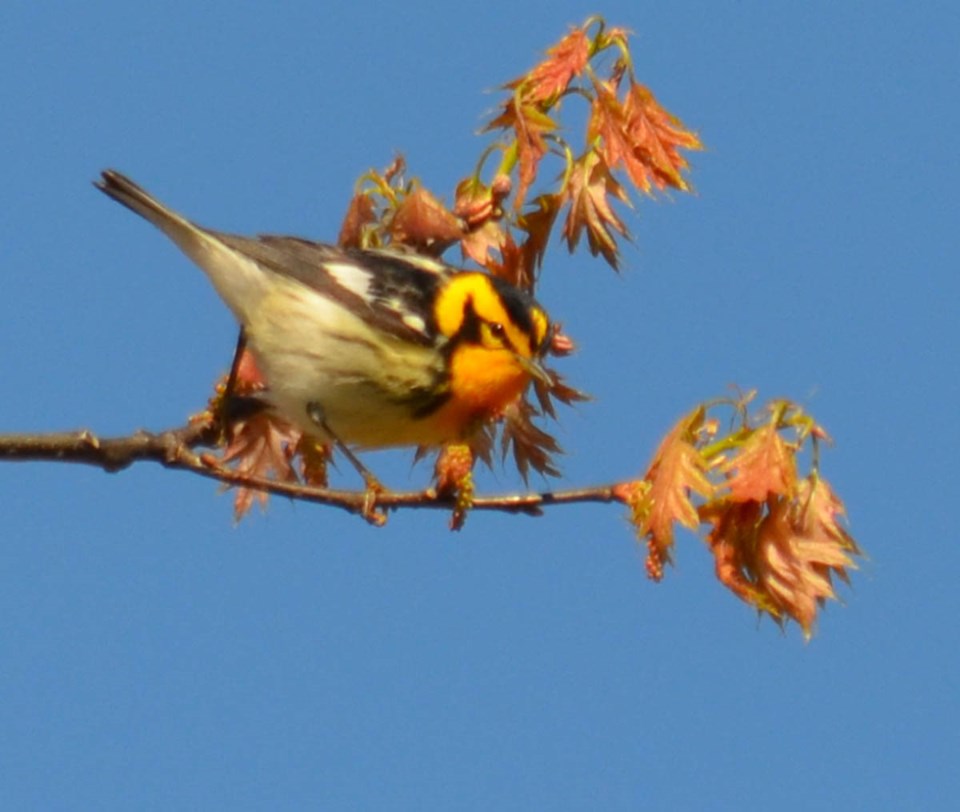Listening to Bob McDonald on the Quirks and Quark’s show, Bob was saying how many of the songbirds are finding it difficult to cope with habitat loss and the warming climate. The problem is that it might be just as hot in the next room as in the ‘kitchen’. The accompanying photo of the Blackburnian Warbler that I took last week might be an indication of this changing of habitat. I had marked this beauty in my old bird book but it has been many years since I have seen one here.
We all know that numerous different species are on the endangered list and some are facing extinction – indeed there are many organizations trying to help the critters. Some are even trying to help the homo sapiens who are having troubles in their own kitchens as drought and famine coupled with political problems throw the kitchen into chaos. Take, for example, our current provincial leader (please) and her efforts to keep the planet cool by weaning us from fossil fuels and onto wind and solar electricity.
It matters not that some people like to heat with natural gas, or even, heaven forfend, wood: Wynne would have us all using thermal heaters from underground water (that should cool the earth) or storage battery packs to heat our houses with electricity. Solar heating has been around since the dinosaurs were lizards and the wind blowing through the cracks in the wall or around doors is just another of nature’s heat exchangers, so Wynne is not recreating the wheel here.
Managing the lives of bears and pickerel (okay, walleye) through not shooting and limited catch methods is just a means of trying to adjust for habitat loss. Not feeding the ducks and geese rules will eventually creep into not feeding the chickadees and blue jays. Building underpasses for turtles was another noble idea but training the turtles part of the project was cancelled for lack of funds and teachers. Installing roadway fences in the southern part of the province keeps the moose off the roads down there but only sent the moose north for freer range along northern highways. Or maybe the moose just stayed up here because they knew about the fences down south . . .
What I’m trying to say is that despite all out efforts at managing the critters and their environment, it is not working. Little birds are showing up in new places as they try to get out of the kitchen. Bears are seen along the flowery waterfront instead of beside a pristine lake in the deep woods. Racoons are taking over Toronto (they are the four-legged ones with the black masks, not the two-legged ones hiding behind a balaclava and carrying pistols).
The real problem with loss of habitat and likely the warming climate is that there are too many people. It is a simple problem with perhaps too unpleasant solutions. If we had held our global population at about a billion people we could have avoided many of the problems we now face. Well, not us, but our fellow inhabitants. There was plenty of room for about a billion of us and all the lions, tigers, rhinos and passenger pigeons – even black bears – that originally shared the planet.
But we – homo sapiens – were just too damn smart for the good of us all. There is now some 7.5 billion of us using up resources and space, with no sign of slowing down yet. How we got to this number is more than the result of natural growth. In the beginning, before we learned how to get more food from the earth by seeding and harvesting, we died off at younger ages and indeed succumbed to the various checks and balances that nature had built into her system.
However, the twin forces of religion (fear) and capitalism (greed) demanded more and more people to support these systems of social and economic growth. Indeed, even today, we need more people and more jobs in our little town to be able to afford the lifestyle we have chosen. Little or nothing is being done to reign in or even decrease the population of the world. China’s old one-child policy was decried as cruel but if the world would adapt such a policy for the next few hundred years we might get back to a balance of sustainability that included the other inhabitants as well as ourselves. We continue to use up resources and space at a breakneck speed, all the while enjoying our comfortable ride through life.
Imagine what our world would look like with one seventh of the population. You and I would still be here, of course, but some of our neighbours would be missing (make your own list). There would be lots of fish in the lake, deer in the forest and songbirds in our trees. We might never have gotten to the urbanization period and still be bartering for foods and goods, but that might have been okay. Oh we would still have used our smarts and developed neat stuff like cell phones and all the pills we need but there would simply be fewer of us.
Naw, I guess not. But if you think we are going to get out of the ever hotter kitchen and go to Mars, it just isn’t going to happen. There isn’t a rocket ship big enough for 6 billion of us. In the meantime we should enjoy seeing such beautiful creatures as the Blackburnian – the next generation might never see one. Just saying.



